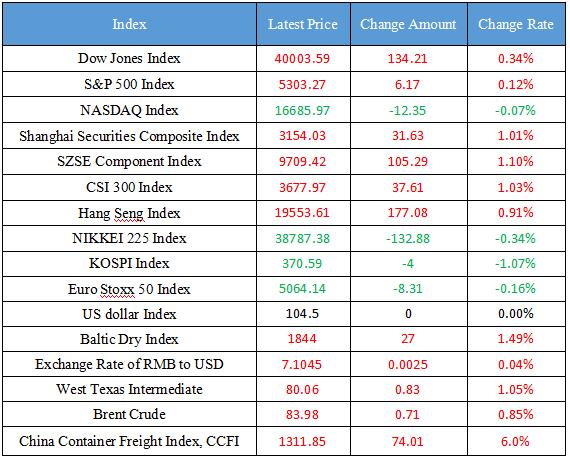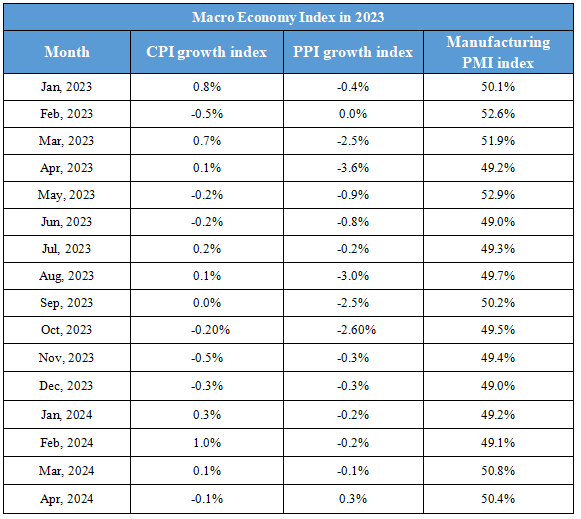May 20th Macroeconomic Index: IEA Warns of Critical Mineral Shortages, Beijing Reduces Provident Fund Loan Rates
Latest Global Major Index

International Crude Price Trend and Exchange Rate of RMB to USD Trend

Domestic News
1. The International Energy Agency warns of the risk of future shortages of critical minerals
2. Coal prices are stable, and it may rise slightly in the later period of temperature rising
3. Beijing has implemented a reduction in the interest rate of provident fund loans
4. The largest single water electrolysis hydrogen production equipment in China rolled off the assembly line at CSSC 718
5. The release of typical cases of green and low-carbon energy transformation and technical exchange meeting were held in Beijing
International News
1. The Federal Reserve may compromise on the bank's capital increase plan
2. The retail price of gold in Japan hit a new high for 4 consecutive days, and the price of platinum soared by nearly 16% in a month
3. Central bank officials poured cold water on interest rate cut expectations, and European stock markets fell
4. The Baltic Dry Bulk Freight Index recorded its worst weekly performance in seven weeks
5. Conference Board: The future economic situation in the United States will be weaker
Domestic News
1. The International Energy Agency warns of the risk of future shortages of critical minerals
The second annual assessment report on the critical minerals market released by the International Energy Agency on the 17th warned that the fell of the production prices of some minerals critical to the green energy transition could lead to insufficient investment and the risk of supply shortages in the future. Prices of critical minerals, which make clean energy technology products such as electric vehicles, wind turbines and solar panels, have fallen back to pre-pandemic levels as supply has caught up with or outpaced demand, the IEA report said. While lower prices are good for consumers, they could dissuade investors from producing future production to meet the growing global appetite for these minerals, especially as many countries plan to phase out gasoline engines within 10 years.
2. Coal prices are stable, and it may rise slightly in the later period of temperature rising
On the afternoon of May 17, the latest report on the easy coal index released by the Yi Coal Research Institute showed that coal prices have been stable recently. The analysis believes that with the rise in temperature, the downstream demand will gradually transition to the peak season, and the coal price may usher in a slight increase in the later period. The report shows that in the past week, the market sales in the mining area have been stable, the downstream rigid demand is the mainstay, the speculative sentiment is general, the price is fluctuated, the demand for the auction mining area in Yulin area of Shaanxi Province has remained relatively stable, and the general performance of other mining areas is average, and the price of some mines has fallen slightly. The Bohai port market is stable, the downstream demand is average, the shipper ships normally, and some traders are optimistic about the replenishment before the peak summer, so the mood is not pessimistic, the quotation is relatively firm, and the price is relatively stable throughout the week. The mainstream price of 5500 kcal coal is in the range of 855 yuan-865 yuan/ton, and the mainstream price of 5000 kcal coal is in the range of 760 yuan-770 yuan/ton.
3. Beijing has implemented a reduction in the interest rate of provident fund loans
The reporter called the Beijing Housing Provident Fund Management Center, and the staff said that Beijing has implemented a reduction in loan interest rates. The staff further explained that for personal housing provident fund loans that have been issued before May 18, 2024, the original personal housing provident fund loan interest rate standard will still be implemented, and the adjusted personal housing provident fund loan interest rate standard will be implemented from January 1, 2025. For personal housing provident fund loans that have been accepted before May 18, 2024 and accepted after May 18, 2024 (inclusive), the adjusted personal housing provident fund loan interest rate standard will be implemented.
4. The largest single water electrolysis hydrogen production equipment in China rolled off the assembly line at CSSC 718
The reporter learned from the 718th Research Institute of China Shipbuilding Group that the largest single hydrogen production capacity of 3000Nm³/h water electrolysis hydrogen production equipment independently developed by China Shipbuilding (Handan) Perry Hydrogen Energy Technology Co., Ltd., a subsidiary of the 718th Institute, was recently rolled off the assembly line in Handan, Hebei Province. It is reported that the equipment has broken through a number of cutting-edge technologies such as high power, high electric density, wide load, and low power consumption, and has realized the leap of hydrogen production from 2000Nm³/h to 3000Nm³/h, which can significantly increase the production capacity of a single machine and reduce production input and operating costs. (Xinhua Finance)
5. The release of typical cases of green and low-carbon energy transformation and technical exchange meeting were held in Beijing
On May 19, the release of typical cases of green and low-carbon energy transformation and technical exchange meeting hosted by the National Energy Administration and undertaken by the Electric Power Planning and Design Institute was held in Beijing, aiming to give full play to the leading role of typical cases and do a good job in experience exchange and promotion. It is reported that in order to fully implement the spirit of the 20th National Congress of the Communist Party of China, further promote the energy revolution, accelerate the planning and construction of a new energy system, and explore, summarize and exchange successful experiences and beneficial practices in various places, the National Energy Administration organized and carried out the collection of typical cases of green and low-carbon energy transformation, selected 23 typical cases, and compiled and formed a "compilation of typical cases of green and low-carbon energy transformation". (Xinhua News Agency)
International News
1. The Federal Reserve may compromise on the bank's capital increase plan
According to the Wall Street Journal, the Fed asked banks to hold more capital, however, JPMorgan Chase CEO Dimon and other CEOs of big banks took a hawkish stance on the proposal, and now it seems that their strategy may have worked. According to people familiar with the matter, the Federal Reserve and two other federal regulators are working on a new plan that would significantly ease the nearly 20% capital increase requirements of large U.S. banks. The capital increase requirement is to ensure that large banks have sufficient buffers to absorb potential losses, and the new plan may be only half of the original plan. This is a major win for the bank. The banks said the initially proposed rules would lead to a decline in profits and limit lending. It also represents a shift in the balance of power between the big US banks and regulators, ending an era in which the Fed had the upper hand.
2. The retail price of gold in Japan hit a new high for 4 consecutive days, and the price of platinum soared by nearly 16% in a month
This week, the retail price of gold in Japan hit a record high for the fourth consecutive day, and the price of platinum and silver also rose rapidly. According to the data, the price of platinum in Japan has reached 6,040 yen (about 280.9 yuan) per gram this Saturday, an increase of nearly 16% in a month. In addition, platinum futures in Japan also traded at their highest level in 11 years this week. According to the survey, the global platinum supply has been in a state of shortage in the past two years, and its price is expected to rise further in the future, which will also further push up the transaction price of platinum in Japan. (CCTV Finance)
3. Central bank officials poured cold water on interest rate cut expectations, and European stock markets fell
European stocks edged lower on Friday, following a slight pullback in U.S. stocks, as comments from central bankers dampened optimism about the prospect of interest rate cuts. ECB Executive Board member Isabel Schnabel warned against back-to-back rate cuts in June and July, saying that inflation risks are still skewed to the upside and should be cautious, which gave markets a sober tone. Earlier, three Fed officials hinted that interest rates should remain high for longer. Tatjana Puhan, head of asset allocation at Swiss Re, said sentiment swings around monetary policy expectations were normal. Still, given that further rate hikes by central banks are unlikely at this time, "and we are still in a relatively favourable growth environment right now, investing in risk assets remains a good option in the coming weeks, with potentially modest upside potential," Puhan added.
4. The Baltic Dry Bulk Freight Index recorded its worst weekly performance in seven weeks
The Baltic Dry Bulk Index recorded its worst week in seven weeks, as freight rates for all types of vessels weakened. The Baltic Dry Index rose 27 points, or 1.49%, to 1,844 points. The capesize freight index rose 117 points, or 4.57%, to 2,675 points. The average daily profit of capesize vessels rose $962 to $22,180. The Panamax freight index fell 20 points, or 1.08%, to 1,825 points, down about 10% for the week. Panamax vessels made an average daily profit of $175 to $16,427. The Supramax bulk carrier freight index fell 20 points to 1,405 points.
5. Conference Board: The future economic situation in the United States will be weaker
Justyna Zabinska-La Monica, senior manager of business cycle indicators at the Conference Board, said that another decline in US economic indicators confirms that economic conditions will be weaker in the future. The deterioration of the outlook for the business environment by consumers, a decrease in new orders, a negative yield spread and a decline in new building permits contributed to the decline in the April indicator. In addition, the Conference Board's leading indicator showed negative monthly growth for the first time since October last year. Although the six-month and annual growth rates no longer signal an impending recession, they still indicate that there will be serious headwinds for future growth. In fact, high inflation, high interest rates, rising household debt, and depleted pandemic savings are all expected to continue to weigh on the U.S. economy in 2024. As a result, we expect real GDP growth to slow to below 1% in Q2-Q3 2024.
Domestic Macro Economy Index














